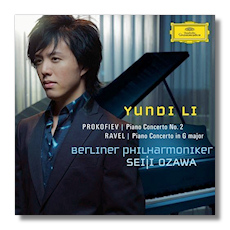
The Internet's Premier Classical Music Source
Related Links
-
Prokofieff Reviews
Ravel Reviews - Latest Reviews
- More Reviews
-
By Composer
-
Collections
DVD & Blu-ray
Books
Concert Reviews
Articles/Interviews
Software
Audio
Search Amazon
Recommended Links
Site News
 CD Review
CD Review
Prokofieff / Ravel

Piano Concertos
- Serge Prokofieff: Concerto for Piano #2, in G minor, Op. 16
- Maurice Ravel: Concerto for Piano in G Major
Yundi Li, piano
Berlin Philharmonic Orchestra/Seiji Ozawa
Deutsche Grammophon 4776593 51:10
Yundi Li, winner of the Chopin Competition in 2000, is among the more prominent young pianists today, and this CD shows why. It was issued in November, 2007 and was the sixth recording by this brilliant young pianist, known previously for his Chopin and Liszt. The Prokofieff Second Concerto, despite the claims made in the promo material to this CD and in other ill-informed references on the web and elsewhere, is a fairly popular concerto: ArkivMusic, for example, lists 26 recordings currently available, with the most prominent being those by Ashkenazy, Gutierrez, Beroff, John Browning and Kun Woo Paik.
I was first introduced to the work by an old RCA LP, circa 1960, with pianist Nicole Henriot (later she became Henriot-Schweitzer) and conductor Charles Munch (her uncle), leading the Boston Symphony Orchestra. The Boston Symphony used to make television broadcasts in the 1960s and Henriot-Schweitzer played this concerto on one of them. Her interpretation there and on the recording wasn't bad, but she dropped so many notes (and whole sections of the massive first movement cadenza) as to disqualify her from any serious consideration. If a pianist is going to play this extremely difficult concerto (easily among the most challenging ever written), he or she had better have lots of technique. Otherwise, that artist might end up overwhelmed by the work in the manner of Henriot-Schweitzer.
Yundi Li has the technique alright, but he may be just a bit too aggressive in his application of it. His outer movements are good, with the first movement cadenza among the best renditions ever put on record. But the inner movements, the Scherzo and Intermezzo, are played too fast. The Intermezzo, with its mixture of wit and brutality, is tossed off as if it is a slightly muscular piece of fluff. It isn't that – Prokofieff wrote the work in the wake of the suicide of a pianist-friend, Maximilian Schmidhof, to whom the concerto is dedicated. In the end, Li's reading is convincing on many levels, but is outpaced by the Gutierrez (Chandos) and Ashkenazy (London).
In the Ravel Concerto, truly a light, slightly muscular piece of fluff, Li is more persuasive. Here he competes with Argerich, also on DG, Thibaudet (London) and others, to offer one of the more compelling versions of this jazz-inspired work. Li may also push tempos a bit here as well, but he captures the often Gershwin-tinged spirit of the piece so well, and elsewhere convincingly imparts a sense of the carefree (in the outer movements) and of nostalgia (in the central Adagio assai) that one becomes caught up in his youthful take on the work. The sound in both concertos is utterly state-of-the-art and Ozawa draws fine playing from the Berlin Philharmonic. In the end, this must be counted as a compelling if flawed Prokofieff Second and a first-rate Ravel.
Copyright © 2008, Robert Cummings




















